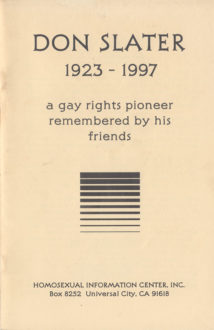 Skeptical of Easy Answers
Skeptical of Easy Answers
by Vern L. Bullough, Ph.D.
Don Slater:
a gay rights pioneer remembered by his friends
©1997 by Homosexual Information Center, Inc.
Jim Schneider, Chairman
Pp. 21–22
Second Printing, revised
Assembled, edited, and composed by Joseph Hansen
Laguna Beach, CA
I met Don Slater after I had talked the ACLU of Southern California into appointing me chair of a committee to consider a new policy on “homosexuality.” This was in 1963, and both Don and Dorr Legg were invited from the homosexual community to participate. We also had a delegate from DOB [Daughters of Bilitis].
Although we essentially agreed at our first meeting that homosexuality should be decriminalized, we spent the next 18 months planning a way to get the board to approve what we wanted. We presented it as a potential policy early in 1964, listened to discussion and debate, and without much change eventually presented it to the board.
As we were planning a celebration of our victory, Don called me to announce that ONE had moved its offices, and we should celebrate at the new location [in Cahuenga Pass]. I telephoned Dorr, and realized I was caught in a cross-fire. Interestingly, I came closer to both sides. Both seemed to trust me, and I acted sometimes as go-between.

I talked to both groups, and participated in Don’s famous demonstration demanding that homosexuals be [allowed into the military] in 1965. Don had wanted us to bring our children, and we finally compromised by Bonnie and myself sitting in the lead car, and traveling the streets of Hollywood, West Hollywood, and wherever else the motorcade went, with signs about homosexuality, and horns blaring. Interestingly, several people noticed us, and several even clapped.
Don was always full of ideas, and although in a sense he was a demanding task-master, he was also a marvelous friend. I wrote for Tangents, and later continued to write for the HIC Newsletter reviews on what Don called troublesome books. Periodically, he would call me to ask a favor, but he was also helpful and supportive when I needed such support. He kept me informed of events in the homosexual community, and when he wanted the presence of myself and my wife, Bonnie, we went, from a benefit performance of Clare Booth Luce’s play, The Women, to lecturing at HIC Center.
We kept in contact when I left the L.A. area for New York, and after I returned, we resumed our friendship, although he refused to let me tape any interview with him. I knew he had been tremendously important in the history of homosexuality, but he was surprisingly modest and unassuming about this role.
In large part, he was also an influence on my ideas on homosexuality, a subject about which we often disagreed, and when I got “too biological” for him, he would always mention his twin brother [Harvey, who was not gay]. In short, Don was one of the influential persons in my life, and he made me a much better scholar and researcher than I might otherwise have been.
His message about being skeptical of easy answers remains with me, and so will the memories of one who I think was in the long run an important influence in changing American ideas.
To Tony [Reyes], as one who has recently gone through the loss of a lifelong partner—memories become all important, and the passage of time does help.
©1997, 2017 by The Tangent Group. All rights reserved.
The HIC is grateful to Stephen Brzoska for his help in digitizing this text.

